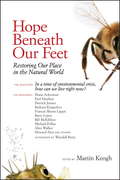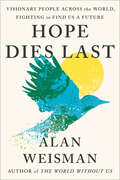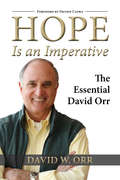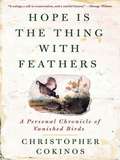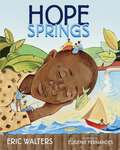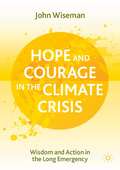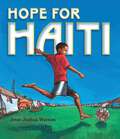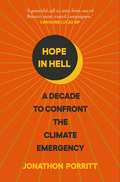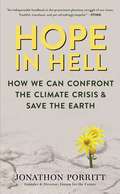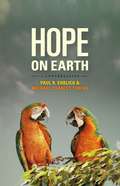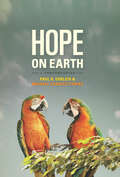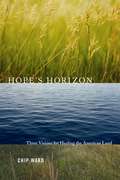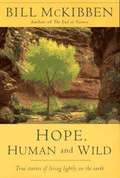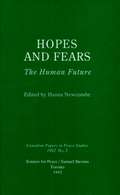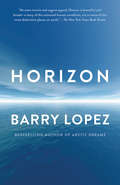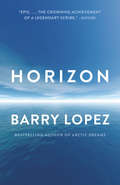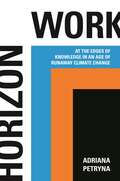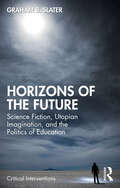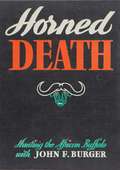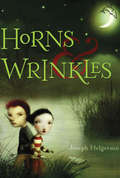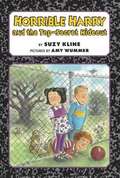- Table View
- List View
Hope Beneath Our Feet: Restoring Our Place in the Natural World
by Barbara Kingsolver Alice Walker Howard Zinn Michael Pollan Martin KeoghThe environmental "tipping point" we approach is more palpable each day, and people are seeing it in ways they can no longer ignore--we need only turn on the news to hear the litany of what is wrong around us. Serious reflection, inspiration, and direction on how to approach the future are now critical. Hope Beneath Our Feet creates a space for change with stories, meditations, and essays that address the question, "If our world is facing an imminent environmental catastrophe, how do I live my life right now?" This collection provides tools, both practical and spiritual, to those who care about our world and to those who are just now realizing they need to care. Featuring prominent environmentalists, artists, CEOs, grassroots activists, religious figures, scientists, policy makers, and indigenous leaders, Hope Beneath Our Feet shows readers how to find constructive ways to channel their energies and fight despair with engagement and participation. Presenting diverse strategies for change as well as grounds for hope, the contributors to this anthology celebrate the ways in which we can all engage in beneficial action for ourselves, our communities, and the world.Contributors include: Diane Ackerman, Paul Hawken, Derrick Jensen, Barbara Kingsolver, Francis Moore Lappé, Barry Lopez, Bill McKibben, Michael Pollan, Alice Walker, Howard Zinn.
Hope Dies Last: Visionary People Across the World, Fighting to Find Us a Future
by Alan WeismanOne of Heatmap's 18 Climate Books to Read in 2025The award-winning environmental journalist&’s extraordinary, long-awaited portrait of hope and resilience as we face a fractured and uncertain futureIn this profoundly human and moving narrative, the bestselling author of The World Without Us returns with a book ten years in the making: a study of what it means to be a human on the front lines of our planet&’s existential crisis. His new book, Hope Dies Last, is a literary evocation of our current predicament and the core resolve of our species against the most precarious odds we have ever faced.To write this book, Weisman traveled the globe, witnessing climate upheaval and other devastations, and meeting the people striving to mitigate and undo our past transgressions. From the flooding Marshall Islands to revived wetlands in Iraq, from the Netherlands and Bangladesh to the Korean DMZ and to cities and coastlines in the U.S. and around the world, he has encountered the best of humanity battling heat, hunger, rising tides, and imperiled nature. He profiles the innovations of big thinkers—engineers, scientists, conservationists, economists, architects, and artists—as they conjure wildly creative, imaginative responses to an uncertain, ominous future. At this unprecedented point in history, as our collective exploits on this planet may lead to our own undoing and we could be among the species marching toward extinction, they refuse to accept defeat.Hope Dies Last fills a crucial gap in the global conversation: Having reached a point of no return in our climate confrontation, how do we feel, behave, act, plan, and dream as we approach a future decidedly different from what we had expected?
Hope Is an Imperative: The Essential David Orr
by Fritjof Capra David W. OrrFor more than three decades, David Orr has been one of the leading voices of the environmental movement, championing the cause of ecological literacy in higher education, helping to establish and shape the field of ecological design, and working tirelessly to raise awareness of the threats to future generations posed by humanity's current unsustainable trajectory. Hope Is an Imperative brings together in a single volume Professor Orr's most important works. These include classics such as "What Is Education For?," one of the most widely reprinted essays in the environmental literature, "The Campus and the Biosphere," which helped launch the green campus movement,and "Loving Children: A Design Problem," which renowned theologian and philosopher Thomas Berry called "the most remarkable essay I've read in my whole life." The book features thirty-three essays, along with an introductory section that considers the evolution of environmentalism, section introductions that place the essays into a larger context, and a foreword by physicist and author Fritjof Capra. Hope Is an Imperative is a comprehensive collection of works by one of the most important thinkers and writers of our time. It offers a complete introduction to the writings of David Orr for readers new to the field, and represents a welcome compendium of key essays for longtime fans. The book is a must-have volume for every environmentalist's bookshelf.
Hope Is the Thing With Feathers
by Christopher CokinosWeaves together natural history, biology, sociology, and personal narrative to tell the story of the lives, habitats, and deaths of six extinct bird species. This book is, in part, an effort to make certain that we never again forget extinct species nor the others of which Cokinos write. As Cokinos traveled to libraries and natural history museums, he learned of other vanished birds: the Ivory-billed Woodpecker, the Heath Hen, the Passenger Pigeon, the Labrador Duck and the Great Auk. He was moved to write about them, and the result is this impressive book about the ¿ghost species¿ of the North American continent. The cover has the look of stained and mottled pages from a naturalist¿s notebook. Illustrations.
Hope Is the Thing With Feathers
by Christopher CokinosA prizewinning poet and nature writer weaves together natural history, biology, sociology, and personal narrative to tell the story of the lives, habitats, and deaths of six extinct bird species.
Hope Springs
by Eric WaltersA drought has settled in the area around the orphanage where Boniface lives. There are long line-ups at the tiny spring where all the local people get their water, and suddenly the orphans are pushed to the back of the line, unwelcome. Boniface's houseparent, Henry, tells him that the people were mean out of fear--they feared there would not be enough water for their families. When the building of the orphanage's well is completed, Boniface has an idea to help the villagers. A lovely story of kindness and heart, this story shows that, through compassion and understanding, true generosity can spring from unexpected places.
Hope and Courage in the Climate Crisis: Wisdom and Action in the Long Emergency
by John WisemanAs the risks of the climate crisis continue to grow, so too do the challenges of facing a harsh climate future with honesty and courage; justice and compassion; meaning and purpose. Hope and Courage in the Climate Crisis explores diverse sources of learning and wisdom –from climate scientists and activists; philosophers and social theorists; Indigenous cultures and ways of life; faith based and spiritual traditions; artists and writers –which can help us live courageous, compassionate and creative lives in a world of rapidly accelerating climatic and ecological risk.Accelerating the transition to a just and resilient zero-carbon society will require visionary leadership and courageous collective action. Awareness that rapid action might still be insufficient to prevent severe and irreversible social and ecological damage is however a source of deep concern for many people passionately committed to decisive climate action. Drawing on broad experience as a climate activist, researcher and policy maker John Wiseman provides a wide ranging, accessible and provocative guided tour of ideas which can inspire and sustain radical hope and defiant courage in the long emergency which now lies before us.
Hope for Haiti
by Jesse Joshua WatsonAs the dust settled on Port-au-Prince, hope was the last thing anybody could see.When the earth shook, his whole neighborhood disappeared. Now a boy and his mother are living in the soccer stadium, in a shelter made of tin and bedsheets, with long lines for food and water. But even with so much sorrow all around, he finds a child playing with a soccer ball made of rags. Soon many children are caught up in the magic of the game that transports them out of their bleak surroundings and into a world where anything is possible.Then the kids are given a truly wonderful gift. A soccer ball might seem simple, but really it's a powerful link between a heartbroken country's past and its hopes for the future. Jesse Joshua Watson has created an inspiring testament to the strength of the Haitian people and the promise of children.
Hope in Hell: A decade to confront the climate emergency
by Jonathon Porritt&‘Brave and unflinching in setting out the reality of the hell towards which we&’re headed, but even more urgent, passionate and compelling about the grounds for hope if we change course fast enough, Hope in Hell is a powerful call to arms from one of Britain&’s most eloquent and trusted campaigners.&’ Caroline Lucas, MP'Extraordinarily powerful, deeply troubling, scathing but ultimately purposeful and hopeful. This book is a clarion call to action, and action now. After reading this, we know for sure that nothing, not even a pandemic, must divert us from the most serious problem facing every living creature on the planet. In plain language, Jonathon Porritt is spelling it out. This is our last chance. Read, mark, learn, and inwardly digest. Then act.' Michael Morpurgo Climate change is the defining issue of our time - we know, beyond reasonable doubt, what that science now tells us. Just as climate change is accelerating, so too must we – summoning up a greater sense of urgency, courage and shared endeavour than humankind has ever seen before. The Age of Climate Change is an age of superlatives: most extreme this, biggest that, most costly ever. The impacts worsen every year, played out in people&’s backyards and communities, and more and more people around the world now realise this is going to be a massive challenge for the rest of their lives. In Hope in Hell, Porritt confronts that dilemma head on. He believes we have time to do what needs to be done, but only if we move now – and move together. In this ultimately optimistic book, he explores all these reasons to be hopeful: new technology; the power of innovation; the mobilisation of young people – and a sense of intergenerational solidarity as older generations come to understand their own obligation to secure a safer world for their children and grandchildren.
Hope in Hell: How We Can Confront the Climate Crisis & Save the Earth
by Jonathon PorrittA book for facing head-on—and averting—the oncoming global climate change disaster, by inspiring people to move from general concern and passive support to active protagonists for change.Climate change is our era's defining issue. We know, beyond reasonable doubt, that climate change is accelerating. To face a challenge greater than humanity has ever seen before, we must also accelerate ourselves, by summoning a sense of urgency, courage, and shared effort to match it. Jonathan Porritt's Hope In Hell is meant to do just that, by confronting the issue directly and strongly, but also with inspiration and hope; it's not too late to avoid the worst consequences of climate change. Ultimately optimistic despite the dire challenge presented to the world, Porritt explores current science and new technologies, mobilization of younger people and political action, and encouraging intergenerational solidarity as older generations learn their own responsibilities in creating a better world for their successors.
Hope on Earth: A Conversation
by Paul R. Ehrlich Michael Charles TobiasHope on Earth is the thought-provoking result of a lively and wide-ranging conversation between two of the world’s leading interdisciplinary environmental scientists: Paul R. Ehrlich, whose book The Population Bomb shook the world in 1968 (and continues to shake it), and Michael Charles Tobias, whose over 40 books and 150 films have been read and/or viewed throughout the world. Hope on Earth offers a rare opportunity to listen in as these deeply knowledgeable and highly creative thinkers offer their takes on the most pressing environmental concerns of the moment. Both Ehrlich and Tobias argue that we are on the verge of environmental catastrophe, as the human population continues to grow without restraint and without significant attempts to deal with overconsumption and the vast depletion of resources and climate problems it creates. Though their views are sympathetic, they differ in their approach and in some key moral stances, giving rise to a heated and engaging dialogue that opens up dozens of new avenues of exploration. They both believe that the impact of a human society on its environment is the direct result of its population size, and through their dialogue they break down the complex social problems that are wrapped up in this idea and attempts to overcome it, hitting firmly upon many controversial topics such as circumcision, religion, reproduction, abortion, animal rights, diet, and gun control. For Ehrlich and Tobias, ethics involve not only how we treat other people directly, but how we treat them and other organisms indirectly through our effects on the environment. University of California, Berkeley professor John Harte joins the duo for part of the conversation, and his substantial expertise on energy and climate change adds a crucial perspective to the discussion of the impact of population on global warming. This engaging and timely book invites readers into an intimate conversation with some of the most eminent voices in science as they offer a powerful and approachable argument that the ethical and scientific issues involved in solving our environmental crisis are deeply intertwined, while offering us an optimistic way forward. Hope on Earth is indeed a conversation we should all be having.
Hope on Earth: A Conversation
by Paul R. Ehrlich Michael Charles TobiasHope on Earth is the thought-provoking result of a lively and wide-ranging conversation between two of the world’s leading interdisciplinary environmental scientists: Paul R. Ehrlich, whose book The Population Bomb shook the world in 1968 (and continues to shake it), and Michael Charles Tobias, whose over 40 books and 150 films have been read and/or viewed throughout the world. Hope on Earth offers a rare opportunity to listen in as these deeply knowledgeable and highly creative thinkers offer their takes on the most pressing environmental concerns of the moment. Both Ehrlich and Tobias argue that we are on the verge of environmental catastrophe, as the human population continues to grow without restraint and without significant attempts to deal with overconsumption and the vast depletion of resources and climate problems it creates. Though their views are sympathetic, they differ in their approach and in some key moral stances, giving rise to a heated and engaging dialogue that opens up dozens of new avenues of exploration. They both believe that the impact of a human society on its environment is the direct result of its population size, and through their dialogue they break down the complex social problems that are wrapped up in this idea and attempts to overcome it, hitting firmly upon many controversial topics such as circumcision, religion, reproduction, abortion, animal rights, diet, and gun control. For Ehrlich and Tobias, ethics involve not only how we treat other people directly, but how we treat them and other organisms indirectly through our effects on the environment. University of California, Berkeley professor John Harte joins the duo for part of the conversation, and his substantial expertise on energy and climate change adds a crucial perspective to the discussion of the impact of population on global warming. This engaging and timely book invites readers into an intimate conversation with some of the most eminent voices in science as they offer a powerful and approachable argument that the ethical and scientific issues involved in solving our environmental crisis are deeply intertwined, while offering us an optimistic way forward. Hope on Earth is indeed a conversation we should all be having.
Hope's Horizon: Three Visions For Healing The American Land
by Chip WardAt a time of widespread environmental pessimism, Hope's Horizon goes on an inspirational offensive. In this entertaining and thought-provoking book, author Chip Ward tells of his travels among a new generation of activists who are moving beyond defensive environmental struggles and advocating pioneering, proactive strategies for healing the land. Chip Ward's three-year odyssey took him behind the scenes of efforts to reconnect fragmented habitats and "re-wild" the North American continent; the campaign to drain Lake Powell and restore Glen Canyon to its natural state; and the struggle to keep nuclear waste off Western Shoshone ancestral lands and, ultimately, to abolish all nuclear power and weapons. These movements, and the practical visionaries leading them, challenge readers with a new paradigm in which land is used in a spirit of collaboration with natural systems rather than domination of them. Broad in its sweep, Hope's Horizon uses its topical subjects as springboards for exploring how we can redefine our place in the world while restoring damaged habitats, replenishing lost diversity, and abandoning harmful technologies. Lively, literate, and free of the grimness that characterizes so much environmental writing, Hope's Horizon will change the way readers see the world. It makes complicated concepts and issues accessible, and wild ideas compelling. And while the book's starting point is a hard-nosed indictment of humanity's failed stewardship of the earth, the stories that follow tell of catalytic optimism and ecological wisdom in the face of self-destructive habit and blind pride.
Hope, Human and Wild: True Stories of Living Lightly on the Earth
by Bill MckibbenIn lyrical, penetrating essays, Bill McKibben offers an optimistic response to his bestselling "The End of Nature", focusing on successful community ventures to preserve the wilderness and reverse environmental damage. From his home in the Adirondack Mountains to a city in Brazil and a state in India, McKibben searches for realistic models for the future of the planet.
Hopes and Fears: The Human Future (Canadian Papers in Peace Studies #2)
by Hanna NewcombeIt has been said many times that the human future is clouded by multiple and mutually interacting problems. While in the 19th century we had the luxury of believing in almost automatic progress - an "onward and upward" assumption - that belief has been shattered by two world wars, more than 150 smaller ones, the invention of weapons of mass destruction, increasing degradation of the environment, both by pollution and resource exhaustion (i.e. adding "bads" and subtracting "goods" from our natural endowment), a horrendous (and increasing) gap between rich and poor within and between nations, explosions of racism and chauvinistic nationalism, increasing use of torture as a police method, totalitarian regimes, repeated episodes of genocide … not a picture of progress toward a better world. And yet, we have not quite lost faith in the human potential for more beneficial and harmonious development.
Horizon
by Barry LopezFrom the National Book Award-winning writer, humanitarian, environmentalist and author of the now-classic Arctic Dreams: a vivid, poetic, capacious work that recollects the travels around the world and the encounters--human, animal, and natural--that have shaped his extraordinary life. Poignantly, powerfully, it also asks "How do we move forward?"Taking us nearly from pole to pole--from modern megacities to some of the most remote regions on the earth--Barry Lopez, hailed by the Los Angeles Times Book Review as "one of our finest writers," gives us his most far-ranging yet personal work to date, in a book that moves through decades of his life as it describes his travels to six regions of the world: from the Oregon coast where he lives to the northernmost reaches of Canada; to the Galapagos; to the Kenyan desert; to Botany Bay in Australia; and in the resounding last section of this magisterial book, unforgettably to the ice shelves of Antarctica. As he revisits his growing up and these myriad travels, Lopez also probes the long history of humanity's quests and explorations, including the prehistoric peoples who trekked across Skraeling Island in northern Canada; the colonialists who plundered Central Africa; an Enlightenment-era Englishman who sailed the Pacific and a Native American emissary who arrived in Japan before it opened to the West. He confronts today's ecotourism in the tropics and visits the haunting remnants of a French colonial prison on Île du Diable in French Guiana. Through these journeys, and friendships forged along the way with scientists, archeologists, artists and local residents, Lopez searches for meaning and purpose in a broken world. With tenderness and intimacy, Horizon evokes the stillness and the silence of the hottest, the coldest and the most desolate places on the globe. It speaks with beauty and urgency to the invisible ties that unite us; voices concern and frustration alongside humanity and hope; and looks forward to our shared future as much as it looks back at a single life. Revelatory, powerful, profound, this is an epic work of nonfiction that makes you see the world differently: a crowning achievement by one of our most humane voices--one needed now more than ever.
Horizon
by Barry LopezFrom the National Book Award-winning author of the now-classic Arctic Dreams, a vivid, poetic, capacious work that recollects the travels around the world and the encounters--human, animal, and natural--that have shaped an extraordinary life.Taking us nearly from pole to pole--from modern megacities to some of the most remote regions on the earth--and across decades of lived experience, Barry Lopez, hailed by the Los Angeles Times Book Review as "one of our finest writers," gives us his most far-ranging yet personal work to date, in a book that moves indelibly, immersively, through his travels to six regions of the world: from Western Oregon to the High Arctic; from the Galápagos to the Kenyan desert; from Botany Bay in Australia to finally, unforgettably, the ice shelves of Antarctica. As he takes us on these myriad travels, Lopez also probes the long history of humanity's quests and explorations, including the prehistoric peoples who trekked across Skraeling Island in northern Canada, the colonialists who plundered Central Africa, an enlightenment-era Englishman who sailed the Pacific, a Native American emissary who found his way into isolationist Japan, and today's ecotourists in the tropics. Throughout his journeys--to some of the hottest, coldest, and most desolate places on the globe--and via friendships he forges along the way with scientists, archaeologists, artists and local residents, Lopez searches for meaning and purpose in a broken world. Horizon is a revelatory, epic work that voices concern and frustration along with humanity and hope--a book that makes you see the world differently, and that is the crowning achievement by one of America's great thinkers and most humane voices.
Horizon
by Barry LopezFrom the National Book Award-winning writer, humanitarian, environmentalist and author of the now-classic Arctic Dreams: a vivid, poetic, capacious work that recollects the travels around the world and the encounters--human, animal, and natural--that have shaped his extraordinary life. Poignantly, powerfully, it also asks "How do we move forward?"Taking us nearly from pole to pole--from modern megacities to some of the most remote regions on the earth--Barry Lopez, hailed by the Los Angeles Times Book Review as "one of our finest writers," gives us his most far-ranging yet personal work to date, in a book that moves through decades of his life as it describes his travels to six regions of the world: from the Oregon coast where he lives to the northernmost reaches of Canada; to the Galapagos; to the Kenyan desert; to Botany Bay in Australia; and in the resounding last section of this magisterial book, unforgettably to the ice shelves of Antarctica. As he revisits his growing up and these myriad travels, Lopez also probes the long history of humanity's quests and explorations, including the prehistoric peoples who trekked across Skraeling Island in northern Canada; the colonialists who plundered Central Africa; an Enlightenment-era Englishman who sailed the Pacific and a Native American emissary who arrived in Japan before it opened to the West. He confronts today's ecotourism in the tropics and visits the haunting remnants of a French colonial prison on Île du Diable in French Guiana. Through these journeys, and friendships forged along the way with scientists, archeologists, artists and local residents, Lopez searches for meaning and purpose in a broken world. With tenderness and intimacy, Horizon evokes the stillness and the silence of the hottest, the coldest and the most desolate places on the globe. It speaks with beauty and urgency to the invisible ties that unite us; voices concern and frustration alongside humanity and hope; and looks forward to our shared future as much as it looks back at a single life. Revelatory, powerful, profound, this is an epic work of nonfiction that makes you see the world differently: a crowning achievement by one of our most humane voices--one needed now more than ever.
Horizon Work: At the Edges of Knowledge in an Age of Runaway Climate Change
by Adriana PetrynaA new way of thinking about the climate crisis as an exercise in delimiting knowable, and habitable, worldsAs carbon dioxide emissions continue to rise, Earth’s fragile ecosystems are growing increasingly unstable and unpredictable. Horizon Work explores how climate change is disrupting our fundamental ability to project how the environment will act over time, and how these rapidly faltering predictions are colliding with the dangerous new realities of emergency response.Anthropologist Adriana Petryna examines the climate crisis through the lens of “horizoning,” a mode of reckoning that considers unnatural disasters against a horizon of expectation in which people and societies can act. She talks to wildfire scientists who, amid chaotic fire seasons and shifting fire behaviors, are revising predictive models calibrated to conditions that no longer exist. Petryna tells the stories of wildland firefighters who could once rely on memory of previous fires to gauge the behaviors of the next. Trust in patterns has become an occupational hazard. Sometimes, the very concept of projection becomes untenable. Yet if all we see is doom, we will overlook something crucial about the scientific and ethical labor needed to hold back climate chaos. Here is where the work of horizoning begins.From experiments probing our planetary points of no return to disaster ecologies where the stark realities of climate change are being confronted, Horizon Work reveals how this new way of thinking has the power to reverse harmful legacies while turning voids where projection falters into spaces of collective action and recoverable futures.
Horizons of the Future: Science Fiction, Utopian Imagination, and the Politics of Education (Critical Interventions)
by Graham B. SlaterHorizons of the Future: Science Fiction, Utopian Imagination, and the Politics of Education examines the relationship between science fiction, education, and social change in the 21st century.Global capitalism is ecologically unsustainable and ethically indefensible; time is running out to alter the course of history if humanity is to have hope of a livable future beyond the next century. However, alternatives are possible, offering much more equality, care, justice, joy, and hope than the established order. Popular culture and schools are key sites of struggles to imagine such alternatives. Drawing on critical theory, cultural studies, and sociology, Slater articulates the promising connection between science fiction and the future of education. He offers cutting-edge engagement with themes, perspectives, and modes of imagination in science fiction that can be mobilized politically and pedagogically to envision and enact critical forms of education that cultivate new utopian ways of relating to self, society, and the future.This thought-provoking book will be of interest to scholars and students in the social sciences and education.
Hormigas (¡Arriba la Lectura!, Level I #62)
by Elsie NelleyLas hormigas son insectos muy pequeños, pero muy trabajadores. Aprende cómo viven y por dónde andan. NIMAC-sourced textbook
Hornbills (Nature's Children)
by Lorien KiteHow many different kinds of hornbills are there? How big is a hornbill? Where do hornbills live? Find the answers to these questions, and learn much more about the physical characteristics, behavior, habitat, and lives of hornbills.
Horned Death
by Ellis Christian Lenz John F. BurgerOriginally published in 1947, this book is considered one of the best ever written on hunting the African buffalo.“John F. Burger, Afrikander and author of this book, would heartily endorse any theatrical effort to simulate the charge of an African bull buffalo—if no human life is to be risked. This notable professional hunter, who is here being introduced to the American public, has miraculously survived to live and tell of many last-ditch encounters with the powerful and crafty buffalo. Mr. Burger’s experiences in the game fields of his native continent cover a period of forty years, and in that time more than one thousand of the massive brutes have fallen to his rifles. As he takes care to explain, only a small number of the animals in that record bag have actually charged; but in that temperate statement there rests proof of his usual success in placing a first, effective hit—the shot that renders a charge improbable. Failure of that first shot, or the effect of factors beyond the hunter’s control, constitutes the explosive cap that can set this specimen of black dynamite into action. Once the buffalo’s charge is actually under way his only objective is to produce a dead hunter. The animal has accomplished his grim purpose in many instances. Too frequently the gored and trampled victim has been a veteran of the trails, not a novice hunter or a defenseless native. In some vitally unaccountable way the buffalo had gained advantages at a rate faster than was allowed the hunter. The man was then denied that last precious asset for survival, luck. Our author lives to tell of his close encounters with the horned death simply because luck never failed to tip the scales in his favor.”
Horns and Wrinkles
by Nicoletta Ceccoli Joseph HelgersonHow can you tell if a river's under a spell? River trolls, rock trolls, blue-wing fairies-the usual suspects. The stretch of the Mississippi where Claire lives has rumors of them all, not that she's ever spotted any. But then Claire's cousin Duke takes a swim and sprouts a horn-a long, pointy, handsome thing. After that, Claire doesn't have much choice but to believe that something rivery is going on, especially since she's the only one who can help Duke lose his new addition.
Horrible Harry and the Top-Secret Hideout (Horrible Harry #37)
by Suzy Kline Amy WummerA story about appreciating and preserving the environment in your own backyard.Doug thought he knew everything about his best friend, Harry . . . until he discovers that Harry has a secret hideout in the woods just outside of South School.Unfortunately, Harry can't keep his hideout a secret much longer, because the land is going to be sold and turned into a big apartment building--unless he and the rest of the kids in Room 3B can save it. Harry has the idea to turn the lot into a nature center, and his friends want to help after he shows them the beautiful wildflowers, yellow spotted salamanders, and slimy tadpoles. But can Harry persuade the school board to agree, too? Or will his horrible fear come true: losing his hideout forever?
